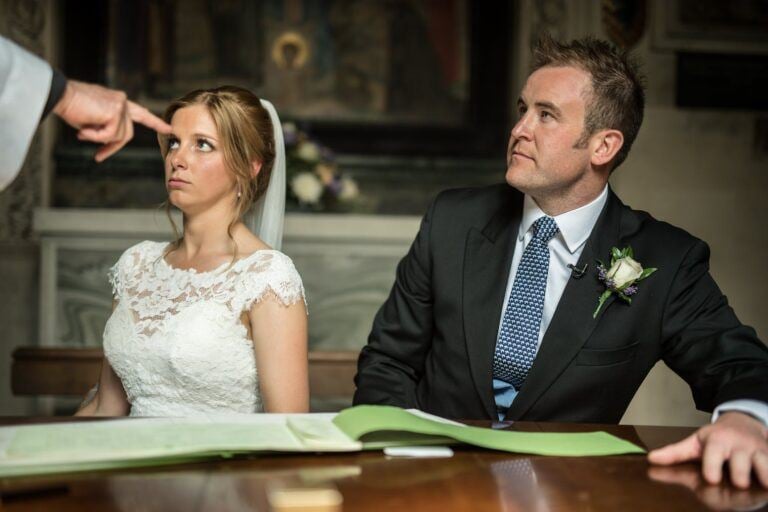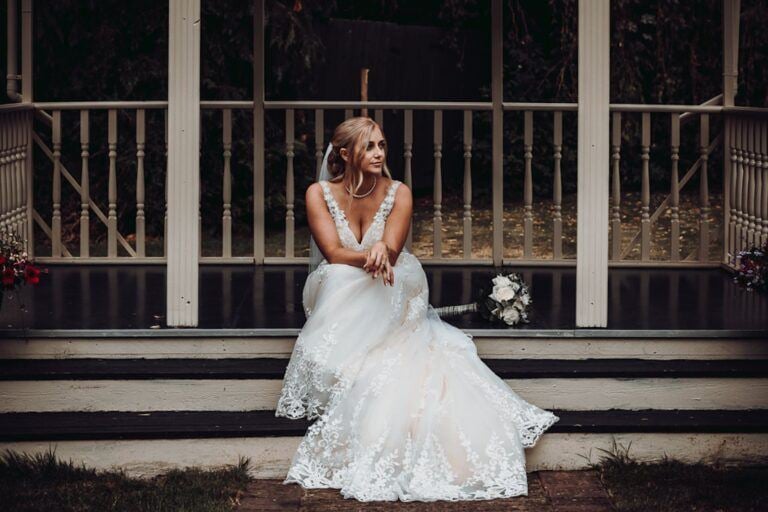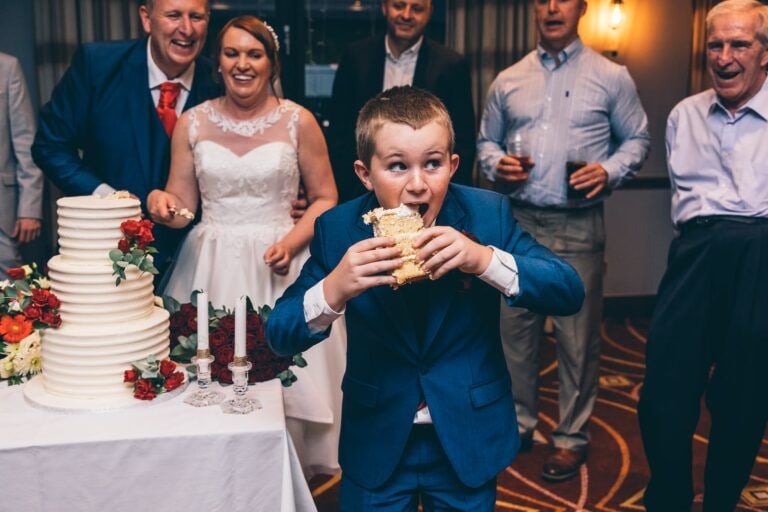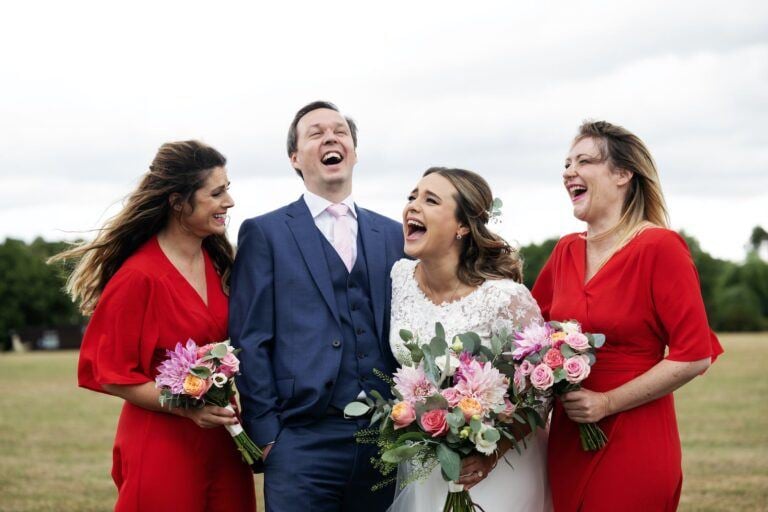Planning a wedding can be a daunting task, but it’s also one of the most exciting moments in your life. Unfortunately, as with life in general, things can sometimes go wrong, and that’s where wedding insurance comes in. This isn’t exactly the most exciting of topics – many brides and grooms don’t even consider it. No creative DIY ideas, or dreamy dress inspiration.
Wedding insurance is therefore one of several hidden wedding costs that many couples overlook. But it’s one of the most important parts of wedding planning, and well worth considering. In our ultimate guide to wedding insurance, we’ll cover everything you need to know about wedding insurance, including what it covers, what it doesn’t cover, how much it costs, why you should have it, and which insurance providers we suggest you consider. Read on for our advice and top tips.
What is wedding insurance?

Wedding insurance (also known as event insurance or special event insurance), is a type of insurance policy that provides financial protection in case something goes wrong either leading up to the wedding or on the day itself. It shouldn’t be confused with liability insurance for wedding suppliers (a separate type of wedding business insurance policy that covers professional suppliers – including photographers, caterers, florists and wedding planners).
The way wedding insurance works depends on what you’re claiming for. You won’t always necessarily receive a lump sum in compensation. For things like a torn wedding dress or dead flowers, you’ll usually get a small payout that will cover the cost of the item. But in the case of venue closure, your provider may simply pay for a new venue directly. Remember that claims come with an excess fee. That means you’ll receive the full amount minus the cost of any excess.
Do I need wedding insurance?

Wedding insurance is very much worth factoring into your overall wedding budget. We suggest you consider having at least basic cover in place in the majority of cases.
Reasons you should consider getting wedding insurance include:
- Your wedding costs a lot: Because wedding insurance provides financial protection, it could help save you loads of money. Weddings are pricey affairs, after all, with the average cost of a wedding in the UK having risen to £20,775 (£23,885 including the ring and honeymoon).
- You have items to protect: Wedding insurance could help you recover or replace important items such as wedding attire, rental equipment, or even wedding gifts. It’s a great way to protect items that will make your wedding day the way you want it.
- You want peace of mind: Wedding insurance could help you avoid an enormous amount of stress. Knowing you have financial protection means you can enjoy planning your wedding and celebrating your big day without worrying about what could go wrong.
- You want an affordable option: Wedding insurance policies are generally affordable, with coverage options and excesses that can be tailored to fit your wedding budget.
Reasons you might not want to get wedding insurance include:
- Low risk of cancellation or issues: If you’re having a small and low-key wedding, with few guests and minimal expenses, wedding insurance might not be necessary or worthwhile.
- Alternative postponement/cancellation options: It’s always worth checking with your venues and suppliers what their specific policies on postponing or cancelling your wedding are, and how much extra this costs. Then you can accurately and confidently insure any remaining elements.
What does wedding insurance cover?

Wedding insurance covers many aspects of the wedding. The most important thing it covers is the possibility of having to cancel the wedding due to uncontrollable circumstances. This includes injury to the bride, groom or close relative. Also normally included would be sudden closure of the venue due to financial failure or a fire or damage at the venue.
In the circumstance that you had to cancel the wedding due to any of these circumstances, most insurers would pay the amount that you have spent on deposits in booking suppliers and venues up to the sum insured, and also what you are contractually obliged to pay in the event of cancellation. Make sure to check you are happy with the sum you choose to insure (typically the full cost of the wedding in the event of a last-minute cancellation) before you take out your policy.
Apart from having to cancel the wedding, there are several other (smaller) things that could potentially go wrong on your wedding day that would be covered by wedding insurance. When it comes to the loss or damage of items, the cost of the relevant items would be paid by the insurer.
Every wedding policy is a little different, though, so we recommend checking the small print before signing up. However, these are the things most wedding insurance policies typically cover:
- Cancellation due to illness, injury, accident or death: This includes you and your partner, as well as your close relatives as defined by the individual policy (unless it’s linked to a pre-existing medical condition). The same people may also be covered if they’re unexpectedly called for jury service or posted overseas in the military – though very few policies cover this, so be sure to check with your provider.
- Cancellation due to unexpected extreme weather: If over half of your guests can’t make your wedding due to extreme weather, you should be covered. Be sure to check the small print though, as many insurance policies differ slightly on this. If you’re hosting an outdoor wedding, consider also adding extra cover as an add-on. This will protect you if on-the-day severe weather conditions ruin the experience, for example, a thunderstorm.
- Venue damage or closure: This protects you if your wedding venue becomes unusable and can no longer honour your booking due to damage or closure. For example, through floods, fires or financial problems. This usually comes under “cancellation cover” in the insurance document, and would pay for another venue. It covers damage to wedding marquees that belong to the venue owner, as well as damage to fixed, permanents structures part of their property.
- Third party marquee cover: This is usually an optional add-on that protects you against damage to a marquee erected on land that belongs to someone other than the marquee owner. It covers the structure itself plus anything inside like tables and chairs.
- Supplier failure: This protects you if your suppliers fail to provide the agreed services due to financial failure, and would pay for a replacement. It can sometimes include a damaged wedding cake, but only if it’s damaged in your possession (as opposed to if the cake maker themselves supplied a damaged cake). Be sure to get a written agreement with your suppliers when booking (as this will be vital to your claim), and check which suppliers your individual policy covers (as this can vary). Most policies don’t typically cover you in the case of supplier no-shows. That is, if a supplier cancels at the last minute and you need to rebook someone else (potentially at a much higher price). Only certain suppliers like photographers and wedding transports may be covered under different sections of cover.
- Photography or video faults: This protects you against damage to the film or a technical fault that means your wedding photos or video can’t be printed or developed. Most policies will typically pay for a photographer to re-shoot your photos or footage with your wedding party. Check if your cover also includes payment towards the costs needed to do this (outfit hire, travel expenses, necessary meals and lodging, venue hire and accessories). Note that simply not liking the photos or footage won’t count as a valid reason to make a claim!
- Lost, stolen or damaged items: This typically includes your wedding dress, wedding rings, wedding cake, wedding flowers, and decor. Note that it doesn’t cover your engagement rings (which you’ll need to add to your home insurance). Be sure to also check your individual policy for any caveats. For example, flowers and cake might not be covered after the reception.
- Lost, stolen or damaged gifts: Often overlooked when it comes to wedding insurance, wedding gifts are collectively very valuable, and well worth insuring for peace of mind. For stolen gifts specifically, you’ll have to report them to the police to make a claim.
- Personal liability: This covers you and your partner in the case of accidental damage to the wedding venue (think red wine spillages on carpets, or fire damage from cigarette ends), or injury to a third party (like slipping on the dancefloor, or spilling a hot drink on a guest). It doesn’t cover accidents caused by your guests.
- Public liability: This is usually an optional add-on, requiring you to upgrade your insurance. It works just like personal liability, but covers accidents caused by your guests too.
What doesn’t wedding insurance cover?

Hopefully you’re not too worried about your partner bailing on the day, because, just to be clear, wedding insurance doesn’t cover cold feet. There are also some other situations it doesn’t cover.
See our list below. For some of these, you may be able to upgrade your basic plan to provide extra cover, so be sure to check the small print to see exactly what is and isn’t included.
- Cold feet: If you or your partner have a change of heart, you won’t be covered.
- Minor reasons: You won’t be covered for any minor issues or incidents. For example, if one of your table centrepieces gets damaged, you don’t like your wedding photos, or you have an argument with one of your guests.
- Pre-existing conditions: This includes any underlying medical conditions (though you may be able to upgrade your basic plan to include this).
- Financial difficulties: You won’t be covered if you can no longer afford the wedding. The exception is redundancy (though your policy may require you to have been made redundant a certain length of time after taking it out). You also won’t be covered if you’re ill with a pre-existing condition on a basic insurance plan (but can usually upgrade to include this).
- Damage due to negligence: If you leave important items like your wedding gifts unattended for an unreasonable length of time, you won’t be covered.
- Deliberate acts of damage: If you cause deliberate damage to your venue or other wedding items (like hack away at your cake before the official cake-cutting), you won’t be covered.
How much does wedding insurance cost?

The cost of wedding insurance in the UK varies depending on the value of your wedding and on what you want covered. It can cost anywhere from £27 for a basic policy of £3,000 of cover, and up to £600 or even more for the most comprehensive cover. It goes without saying that the larger and more elaborate the wedding (i.e. the more guests you have, and the more expensive items you choose to include), the more you’ll have to pay. For extras like pre-existing medical conditions, insuring an outdoor wedding, having a separate marquee, or insuring ceremonial swords, you’ll need to pay a premium.
For cancellation cover between £20,000 and £30,0000, you can expect to pay £100-150. That’s more than enough to cover the average cost of a wedding in the UK. The super cheap £20 policies are certainly affordable, but may be of little value if they don’t pay out the sort of money you’d need to replace or compensate for any parts of your wedding that don’t go to plan.
What’s the best wedding insurance to buy?

To begin comparing the best deals on the market and find the best wedding insurance policy for you, you’ll need to firstly come up with an approximate cost of your wedding. Bridebook’s handy personalised budget planner tool can help you do just that – without the need for a spreadsheet. You’ll also need to note down any extras you need or want cover for, so you can factor in any optional add-ons. You can then start researching and comparing the most compatible policies.
Make sure you take the time to examine what you’re covered for, including any excesses and insurance limits. One of the most important things to look carefully at is the terms of “supplier failure”. These are the main people you’ll be relying on for your ceremony and reception, so you wouldn’t want to risk going without. You should also look into policies particularly carefully if your wedding plans have any added complications, like having your ceremony and reception on different days, or if your wedding is taking place abroad.
Comparison sites like Compare Wedding Insurance are a good place to start for comparing a range of wedding insurer rates and inclusions. To compare rates for your own specific requirements, we recommend checking out MoneySuperMarket’s personalised comparison creator.
There are several wedding insurance providers in the UK, each with their own unique policies and coverage limits. Some of the most popular specialist insurers include:
When should I take my wedding insurance out?

It’s best to sort out your wedding insurance as soon as possible, ideally before you start paying towards your wedding. The earlier the better, as the cost stays the same regardless of when you book it. Plus the sooner you have it, the sooner you’re covered, which means none of your wedding money will be at risk at any point (besides the amount set as an excess by your provider).
You can take out cover up to 30 months ahead of your big day. That means coverage in the case of venue closure or family illness months or even a year in advance. But even if you’re months into your panic and have already made deposits and booked your suppliers, it’s not too late! As soon as you take out cover for your wedding, any payments you’ve already made may be covered as well. This does depend on the provider though. Some providers, including WedCover, InsureMyDay and CoverMyWedding, only cover deposits paid up to 30 days before the purchase of the policy.
Can I purchase wedding insurance if I’m getting married abroad?

Standard UK wedding insurance policies don’t typically cover weddings abroad, so always double-check before purchasing or look into finding a specialist insurance policy for destination weddings. Wedinsure, along with Dreamsaver and a few others, helpfully cover weddings abroad, so check them out if you’re looking to tie the knot overseas.
How can I reduce the risk of claiming on wedding insurance?

Wedding insurance is a great way to protect your investment in your wedding day, but obviously you want to reduce the risk of things going wrong. Here are a few top tips:
- Choose your suppliers well: Make sure your suppliers are experienced and reliable. Research them thoroughly by reading reviews, checking qualifications, getting recommendations from friends and family members, and meeting them face-to-face.
- Read your contracts carefully: Make sure you know what you’re agreeing to with your suppliers and what’s covered by their insurance policies. Also check the policies of your wedding venue, like their cancellation policy and any restrictions on alcohol or open flames.
- Check in with your suppliers often: Keep in touch with your suppliers throughout your wedding planning – communication is absolutely key. If you’re both on the same page, then things are less likely to go wrong at the last minute.
- Have a Plan B: Have a backup plan in the case of unexpected events (like weather, illness, or other on-the-day emergencies). Ask your suppliers if they have anyone in their network who might be able to step in and help deliver an alternative service or products.
- Reduce hazards where possible: Obviously you want to have fun on your wedding day, but take precautions if you’re considering something risky, like a bonfire or fireworks display. In such cases it’s best to use professionals, who will likely have their own special insurance.
Plan your dream wedding on Bridebook
There you have our ultimate guide to wedding insurance. For our guide to wedding finances and budgeting in general, check out our ultimate wedding budget breakdown for more information, and start planning your wedding with Bridebook today!
You Might Also Like…
- Hidden Wedding Costs Every Couple Needs To Know About
- How Much Does a Wedding Cost? The 2024 UK Average
- The Ultimate Wedding Budget Breakdown
- How Much Does Wedding Insurance Cost?
- Introduction: Your Wedding Budget
